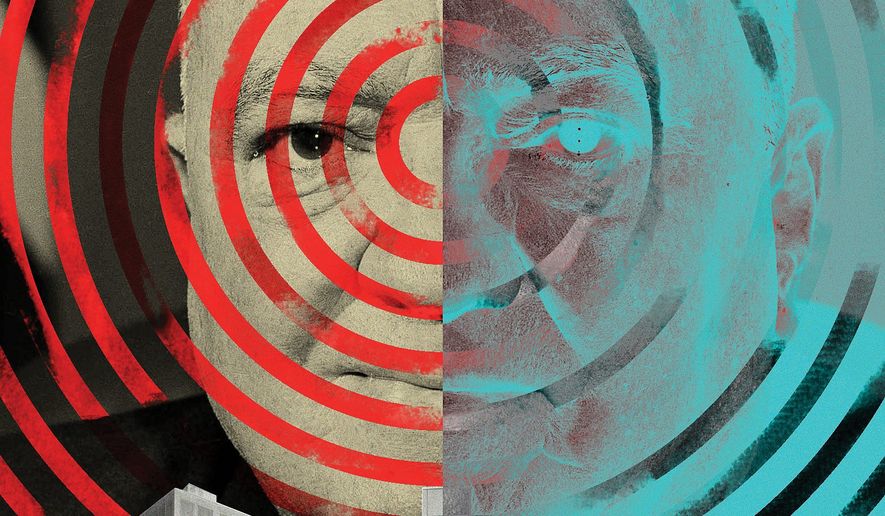OPINION:
The latest example of the cancel culture is a Virginia judge’s ruling that a Black defendant cannot get a fair trial in a courtroom decorated overwhelmingly with portraits of White judges. Fairfax County Circuit Court Judge David Bernhard ordered that the paintings be removed for the upcoming trial of a man charged with assaulting a police officer and other crimes.
As if the defendant is unaware that the vast majority of Americans are White, the judge said in an opinion, “The court is concerned the portraits may serve as unintended but implicit symbols that suggest the courtroom may be a place historically administered by whites for whites, and that thus others are of a lesser standing in the dispensing of justice.”
Foolish as the efforts to erase our history may be, one symbol of injustice and abuse of power remains untouched: the J. Edgar Hoover Building.
Hoover was a Jekyll and Hyde figure. On the one hand, in his nearly 50 years as director, he established the FBI — despite the recent corruption at the top — as the most admired law enforcement agency in the world.
Hoover would not stand for subjecting suspects to brutality, a common practice within police departments back then. Long before the U.S. Supreme Court’s 1966 decision in Miranda v. Arizona, Hoover required FBI agents to advise suspects of their rights when they were arrested.
Hoover created the FBI fingerprint files, the FBI laboratory and the filing system, all advanced techniques for tracking down criminals or exonerating those unfairly charged.
But in his reign as director, Hoover, who died in office in 1972, engaged in the most massive injustices and abuses of Americans’ rights we have ever seen.
The key to Hoover’s long duration as FBI director were the secret files he ordered compiled to use as blackmail against presidents and members of Congress.
“The moment [Hoover] would get something on a senator,” said William Sullivan, who became the number three official in the bureau under Hoover, “he’d send one of the errand boys up and advise the senator that ‘we’re in the course of an investigation, and we by chance happened to come up with this data on your daughter. But we wanted you to know this. We realize you’d want to know it.’ Well, Jesus, what does that tell the senator? From that time on, the senator’s right in his pocket.”
Roy L. Elson, the administrative assistant to Sen. Carl T. Hayden, experienced this first-hand. Hoover wanted an additional appropriation for the new FBI building on Pennsylvania Avenue. Elson had reservations about the request, but Cartha D. “Deke” DeLoach, one of the FBI’s top officials, met with him and “hinted” that he had “information that was unflattering and detrimental to my marital situation and that the senator might be disturbed,” Elson, who was then married to his second wife, told me for my book “The Secrets of the FBI.”
“I was certainly vulnerable that way,” Elson said. “The implication was there was information about my sex life. There was no doubt in my mind what he was talking about.”
Elson suggested that they both tell Hayden, who headed the Senate Appropriations Committee, about his affair.
“Bring the photos if you have them,” Elson told DeLoach.
“At that point,” Elson recalled, “He started backing off … He said, ‘I’m only joking.’ Bulls***,” Elson said. “I interpreted it as attempted blackmail.”
Likewise, Hoover made sure that both President Johnson and President Kennedy were aware that his files contained dirt on them. For that reason, they both admitted privately they would never consider firing him.
Beyond the secret files, Hoover confused violations of espionage laws with legitimate anti-government protests. He helped Sen. Joe McCarthy tarnish innocent Americans with phony charges that they were Communists or spies.
As evidenced by off-the-record remarks he delivered to newspaper editors, Hoover was an unabashed racist. He outrageously conducted illegal surveillance of Martin Luther King Jr. And while he made a few Blacks FBI agents, it was only because they were his drivers, and he did not want them drafted into the Army.
Meanwhile, Hoover ignored the Mafia until it had a stranglehold on many American cities. He refused to investigate political corruption.
After his death, the Justice Department and FBI found that Hoover had illegally used the FBI to maintain and refurbish his home in Washington.
“Hoover [and some of his aides] would be prosecuted under today’s standards. No question of it. And should have been,” Buck Revell, formerly the bureau’s associate deputy director over investigations, told me.
Despite media reports, Hoover was not a cross-dresser. And while he initially ignored threats of violence against civil rights crusaders, under prodding by Attorney General Robert F. Kennedy, Hoover ordered undercover operations that wiped out the Ku Klux Klan.
But looking at Hoover’s massive abuses and violations of Americans’ rights, it would be difficult to imagine an individual less deserving of having a federal building named after him, much less the headquarters of the FBI, which is so important to protecting our liberty and way of life.
• Ronald Kessler, a former Washington Post and Wall Street Journal investigative reporter, is the author of “The Secrets of the FBI.”




Please read our comment policy before commenting.